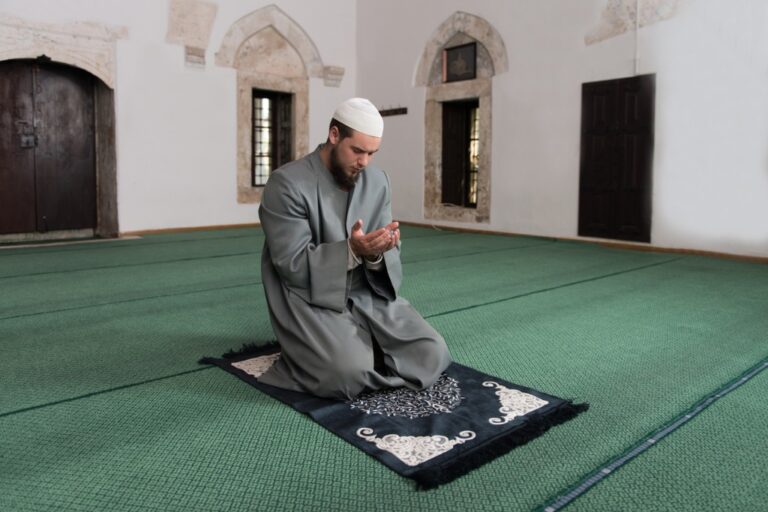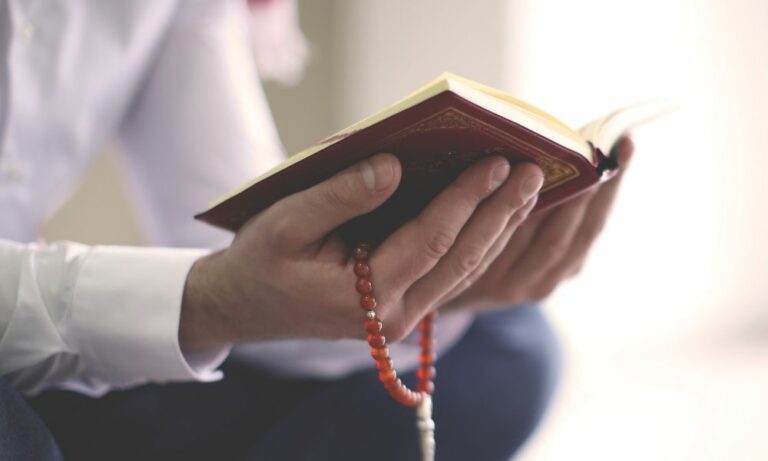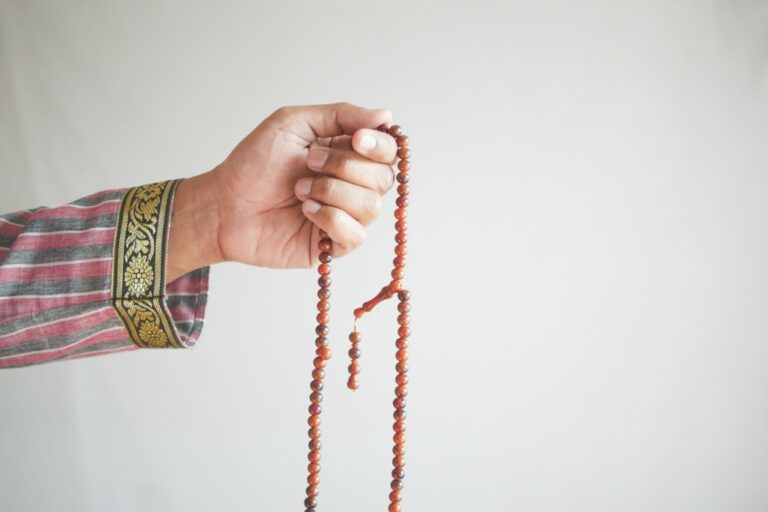How Many Rakats In Fajr?
As the day’s first prayer, Fajr holds a special place in the hearts of Muslims. It marks the beginning of a new day and serves as a powerful connection between us and Allah SWT.
This article will explore how many Rakats are performed during Fajr prayer, how you should perform them, and most importantly… How waking up for Fajr prayer can help you get quality sleep! Sounds strange, right? But that’s a fact.
So, without further ado, let’s begin!
Fajr Prayer: An Overview
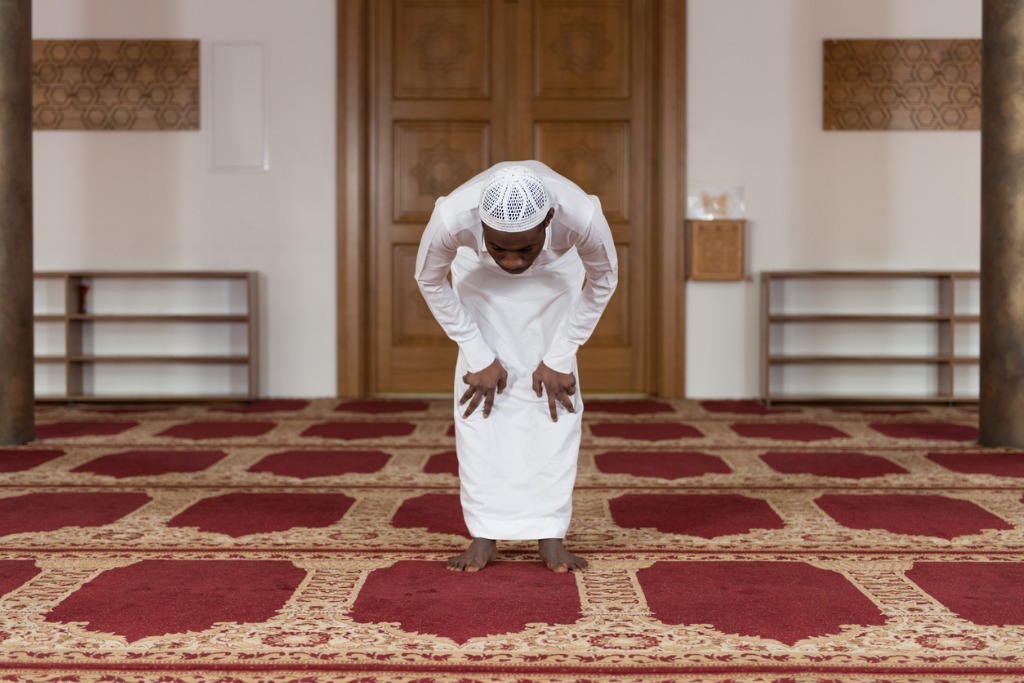

The Fajr prayer holds immense importance in the Islamic traditions. Among the five daily prayers or Salat that you are obliged to perform, Fajr marks the beginning of each day in the Islamic calendar, even before the sun rises.
Regardless of where you are, the time for Fajr begins at dawn and concludes just before the sun ascends the horizon.
This prayer comprises four Rakats or units: two Sunnat Moakaddah and two Fard. The term ‘Sunnat Mokadda’ indicates actions that our beloved Prophet Muhammad (PBUH) practiced consistently and earnestly recommended to his followers.
These two Rakats are highly commendable, even though they are not obligatory.
In contrast, the ‘Fard’ obligations are mandated by Islamic law and hold the status of being mandatory. Neglecting them without a valid reason is viewed as a transgression.
Making Fajr a regular part of your routine brings spiritual and tangible rewards. Engaging in this devotion during the early hours shows blessings that envelop your entire day as a protective shield against potential sins that might lead to consequences in the hereafter.
The Number Of Rakats In Fajr Prayer


Now, let’s explore the number of Rakats performed during the Fajr prayer in more detail.
Sunnah Rakats
Islam recommends Sunnah Rakats before Fajr Salat. Two voluntary Rakats should precede the obligatory Fajr prayer. Prophet Muhammad PBUH performed these Sunnah Rakats regularly and encouraged his followers to do so.
They help us purify our hearts, seek Allah SWT’s blessings, and strengthen our relationship with Him. These extra rakats can bring us many rewards and strengthen our faith InshAllah.
Fard Rakats
Fard Rakats are an essential component of the Fajr prayer. The two mandatory Rakats come after the Sunnah ones. They must be performed before sunrise. Otherwise, they will be invalid.
Performing these obligatory prayers offers entry into Jannah (paradise) InshAllah, brings many blessings throughout the day, and protects one from the fires of hell.
Both hadiths (sayings of Prophet Muhammad PBUH) and the Quran emphasize the significance of performing the Fajr prayer, including the Fard Rakats. As a result, every Muslim believer must fulfil this obligation.
Recite These Two Surahs in the Two Rakats


Abu Hurayrah R.A narrated that:
أَنَّ اَلنَّبِيَّ - صلى الله عليه وسلم -قَرَأَ فِي رَكْعَتَيْ اَلْفَجْرِ : ( قُلْ يَا أَيُّهَا اَلْكَافِرُونَ ) و : ( قُلْ هُوَ اَللَّهُ أَحَدٌ ) } رَوَاهُ مُسْلِمٌ . 1
The Prophet (PBUH) recited Surat al-Kafirun and Surat al-Ikhlas in the two Rak’at of the Fajr (prayer). [Reported by Muslim]. Bulugh al-Maram
The Importance of Fajr Prayer in Islam
Fajr prayer holds great significance among the five daily prayers in Islam, making it the key to heaven and a pathway to Jannah. This is because it empowers you to initiate your day by connecting with Allah SWT, expressing gratitude, and seeking His guidance before embarking on other tasks.
Comprising four Rakats, this prayer not only bestows blessings upon your day but also protects against sins and the fires of hell.
Consequently, your dedication lies not only in performing the Fajr prayer on time but also in offering it with unwavering devotion and heartfelt submission.
Regular practice of Fajr leads to a balanced life marked by serenity and success, not only in a spiritual sense but also in health and prosperity.
The discipline it nurtures encourages mindfulness, which extends its positive influence across all facets of your life, whether personal, professional, social, or emotional.
Thus, through daily commitment to Fajr, you find purposeful direction in upholding your Deen while fostering an environment that nurtures holistic well-being in your journey.
How To Perform Fajr Rakat: A Step-by-Step Guide
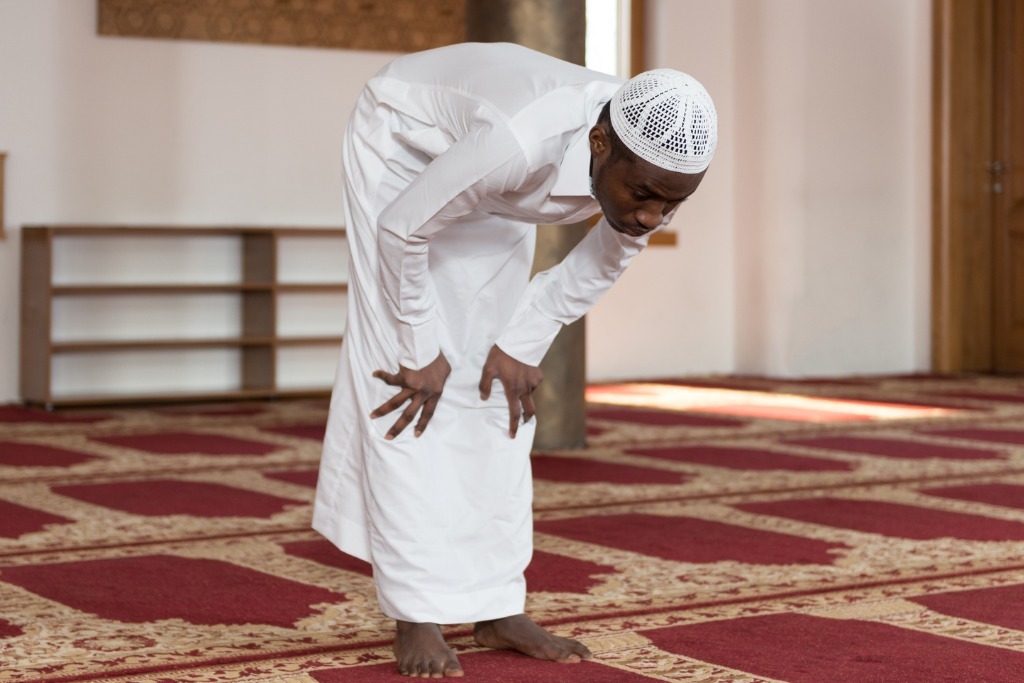

The following steps are required to perform the two Sunnah and two Fard Rakats:
- Start with niyyah (intention) that you are praying either Sunnah or Fard prayer.
- Start by standing upright, facing the qibla (direction of the Kaaba).
- Raise your hands up to your ears or shoulders and say “Allahu Akbar” to start the prayer.
- Place your right hand over your left hand on your chest.
- Recite the first chapter of the Quran, which is called Surah Al-Fatiha.
- After Surah Al-Fatiha, recite any other portion or chapter from the Quran.
- Bow down into the Ruku position, keeping your back straight and hands resting on your knees.
- Say “Subhana Rabbiyal Adheem” (Glory be to my Lord, the Most Great) three times while in Ruku position.
- Stand straight after Ruku and say, “Sami Allahu liman hamidah, Rabbana wa lakal hand” (Allah listens to those who praise Him, our Lord, all praise is for You).
- Go into Sujood (prostration) position by placing your forehead, nose, hands, knees, and toes on the ground. (Sahih Muslim 490e)
- In the Sujood position, say “Subhana Rabbiyal A’la” (Glory be to my Lord, the Most High) three times.
- Then rise from this position and sit briefly, then perform another sujood. After completing the second Sujood, stand up and repeat all the previous steps.
- When you stand up for the second rakah, Repeat steps 4 – 11 for the second rakah.
- After completing both Rakats, sit in a sitting posture and recite Tashahhud. After that, repeat Durood-e-Ibrahimi and make Dua.”
- Finally, end the prayer with Tasleem by turning your head to each side, starting from the right, and saying, “Assalamu alaikum wa rahmatullah” (Peace be upon you and the mercy of Allah) to conclude the prayer. (Jami` at-Tirmidhi 295)
- Remember, whenever you enter the bowing position, you must say the takbir “Allahu Akbar.” Still, when you rise from it, you don’t say takbir; instead, you say “Sami Allahuliman Hamidah” and “Rabban Walakal Hamd.” Then, for going into Sujood, you say takbir.
- A general rule you should remember is that whenever you change your position, you have to say “Takbir” except for rising from bowing.
We have written a complete, detailed guide on the Fajr prayer, so if you want to learn more about it, then you may click How to Perform Fajr Prayer.
Additional Practices And Spiritual Reflection
Following the Fajr prayer, engaging in personal supplications (Du’a) and seeking Allah SWT’s forgiveness is recommended.
Take a moment to thank Allah SWT for the blessings and guidance you have received because of this prayer.
Benefits of Performing Fajr Prayer Regularly


Regulates your circadian rhythm
Circadian rhythm is a biological clock built into our brains that tells us when to wake up and sleep. The advantage of having an optimized circadian rhythm is that it allows you to fall asleep quickly and improves your sleep quality.
Do you know what optimizes this Circadian clock? The Sunlight does!
As you know, we Muslims must wake up in the morning to pray for Fajr. This makes it easier for us to get Sunlight, so our circadian rhythm gets optimized. Making it easier for us to have quality sleep!
You can be more productive
The morning time is considered the most productive and healthy part of the day. This is because, at this time, no one is there to distract you. Moreover, you are fully energetic at this time. If you are a Muslim, you can efficiently utilize this time to get ahead because you must wake up for Fajr before sunrise!
Allah SWT protects you
“ مَنْ صَلَّى الصُّبْحَ فَهُوَ فِي ذِمَّةِ اللَّهِ عَزَّ وَجَلَّ “
“Whoever offers the morning prayer, he is under the protection of Allah, the Mighty and Sublime.” Sunan Ibn Majah 3946
Allah SWT is the best of all protectors, and according to Prophet Muhammad PBUH, when someone prays two Rakats of Fajr, he is under Allah SWT’s Protection!
So, don’t you think missing out on this opportunity is a great loss?
You can enter into Jannah
“ مَنْ صَلَّى الْبَرْدَيْنِ دَخَلَ الْجَنَّةَ “
‘Whoever prays the two cool prayers (`Asr and Fajr) will go to Paradise.’ “ Sahih al-Bukhari 574
Although praying five times a day will get you to heaven, the fact that Prophet Muhammad PBUH specifically mentioned these two salat suggests something special about them. This hadith can be used to demonstrate the significance of these two prayers to Muslims.
Furthermore, the Sunnah prayers of Fajr were mentioned by Prophet Muhammad PBUH as superior to this world and everything it contains.
“ركعتا الفجر خير من الدنيا وما فيها”
“The two Rak’ah before the dawn (Fajr) prayer are better than this world, and all it contains.”
Comparing Fajr Prayer Rakats with other prayers


Fajr prayer has a unique number of rakats compared to other prayers, making it essential for every practicing Muslim to understand and perform correctly. Below is a brief comparison with other prayers.
Dhuhr Prayer
Muslims perform the Dhuhr, or the Noon Prayer after the sun has passed its zenith and begins to decline. This prayer consists of 10 Rakats: four sunnahs, 4 Fard, and two sunnahs.
Asr Prayer
In Islam, the afternoon prayer is known as Asr. It is made up of eight Rakats, among which are Sunnah Non-Mokaddah and Fard. It is believed that offering Asr prayer can gain significant spiritual benefits and blessings from Allah SWT.
Maghrib Prayer
Maghrib prayer, also known as the Evening Prayer, is integral to Islam’s daily devotions. It is made up of seven Rakats: 3 Fard (obligatory), 2 Sunnat Moakkadah (highly recommended), and 2 Nafl (optional).
The number of Rakats performed during Maghrib prayer differs from the number of Rakats performed during other daily prayers. Offering the Maghrib prayer on time is critical, as failing is considered a punishable offense.
Isha Rakats
The night prayer, Isha Salat, is made up of four mandatory Rakats. Offering two Rakats of sunnah after performing 4 Fard Rakats of Isha Salat is recommended. After that, you pray three Rakats of Witr.
Isha is the last prayer of the day. By offering this prayer regularly, you can seek Allah SWT’s blessings and forgiveness.
Conclusion
The Fajr prayer holds immense significance as it forges a pivotal connection between you and Allah SWT.
Comprising four Rakats – two Sunnah Mu’akkadah and two Fard – it serves as the foundation of your day, enveloping it with spiritual devotion and gratitude.
Through its practice, you invite blessings, protection, and a path toward paradise InshAllah. Embracing the Sunnah and Fard Rakats, you converse profoundly with Allah SWT, fostering a life of discipline and purpose.
As the first light of dawn emerges, the Fajr prayer brightens the skies and illuminates your heart, guiding you towards spiritual growth and overall well-being.
FAQs
Are there any additional prayers or Sunnah Rakats recommended before or after Fajr?
Yes, it is highly recommended to perform two Rakats of Sunnah prayer before the obligatory two Rakats of Fajr prayer.
What is the significance of performing the Sunnah Rakats before Fajr?
Performing the Sunnah Rakats before Fajr prayer is a way to earn extra rewards and draw closer to Allah SWT. It is a practice that was regularly observed by Prophet Muhammad (PBUH).
Can I still pray Fard (obligatory) if I miss the Sunnah prayers before Fajr?
Yes, if you miss the Sunnah prayers before Fajr, you can still perform the obligatory two Rakats of Fard prayer for Fajr. However, it is encouraged to try and make up for missed Sunnah prayers at a later time if possible.
How many rak'ahs of Fajr?
As the first prayer of the day, Fajr holds a special place in the hearts of Muslims. It represents the beginning of a new day and serves as a strong connection between us and God Almighty.
This article will explore how many rak'ahs are performed in Fajr prayer, how you should perform them, and most importantly... how waking up for Fajr prayer can help you get a good night's sleep! Sounds strange, doesn't it? But this is a fact.
So, without further ado, let's get started!
Fajr prayer: an overview


Fajr prayer has great importance in Islamic traditions. Of the five daily prayers or prayers that you must perform, Fajr marks the beginning of each day in the Islamic calendar, even before sunrise.
No matter where you are, Fajr time begins at dawn and ends just before the sun rises over the horizon.< /span>
This prayer consists of four rak'ahs or units: two Sunnah Muqaddad and two Fardan. The term “Holy Sunnah” refers to the actions that our beloved Muhammad (may God bless him and grant him peace) constantly practiced and seriously recommended to his followers.
These two rak'ahs are highly recommended, although they are not obligatory.
In contrast, “fard” obligations are imposed under Islamic law and have a mandatory character. Neglecting it without a valid reason is considered a violation.
Making dawn a regular part of your routine brings you spiritual and tangible rewards. Engaging in this devotion during the early hours signifies the blessings that envelop your entire day as a protective shield against possible sins that may lead to consequences in the afterlife.
The number of rak'ahs of dawn prayer


Now, let us explore the number of rak'ahs performed during Fajr prayer in more detail.
Sunnah rak'ahs
Islam recommends two sunnah prayers before the dawn prayer. Two voluntary rak'ahs should be performed before the obligatory dawn prayer. The Prophet Muhammad, may God bless him and grant him peace, regularly performed these Sunni rak’ahs and encouraged his followers to do so.
It helps us purify our hearts, seek the blessings of God Almighty, and strengthen our relationship with Him. These additional rak'ahs can bring us many rewards and strengthen our faith, God willing.
Obligatory rak'ahs
The obligatory rak'ahs are an essential component of the dawn prayer. The two obligatory rak’ahs come after the two sunnah rak’ahs. It must be performed before sunrise. Otherwise it will be invalid.
Performing these obligatory prayers brings one into Paradise, God willing, brings many blessings throughout the day, and protects a person from the fire of Hell.
Both the hadiths (sayings of the Prophet Muhammad, may God bless him and grant him peace) and the Qur’an emphasize the importance of performing the dawn prayer, including the obligatory rak’ahs. As a result, every believing Muslim must perform this duty.
Reciting these two surahs in two rak'ahs


On the authority of Abu Hurairah, may God be pleased with him:
The Prophet - may God bless him and grant him peace - recited in the two rak’ahs of Fajr: (Say, O disbelievers) and: (Say: He is God, One)} Narrated by Muslim. 1
The Prophet, may God bless him and grant him peace, recited Surat Al-Kafirun and Surat Al-Ikhlas in the two rak’ahs of Fajr. [narrated by Muslim]. He reached his goal
The importance of dawn prayer in Islam
The dawn prayer has great importance among the five daily prayers in Islam, which makes it the key to heaven and a path to heaven. This is because it enables you to start your day by communicating with God Almighty, expressing gratitude, and seeking His guidance before embarking on other tasks.
This prayer consists of four rak'ahs and not only gives you blessings on your day but also protects you from sins and the fires of hell.
Therefore, your sincerity lies not only in performing the dawn prayer on time but also in performing it with sincerity and an unwavering heart. Submission.
Regularity in Fajr prayer leads to a balanced life characterized by serenity and success, not only in the spiritual sense but also health and prosperity.
The discipline it nurtures encourages mindfulness, extending its positive impact into all aspects of your life, be it personal, professional or personal. Social or emotional.
Thus, through a daily commitment to Fajr prayer, you find purposeful direction in uplifting your faith while fostering an environment that nurtures the all-encompassing goodness of being on your journey.
How to perform the Fajr rak'ah: a step-by-step guide


To perform the two Sunnah and two obligatory rak'ahs, the following steps are necessary:
- Start with the intention with which you pray, either Sunnah or Fard.
- Start by standing straight, facing the Qiblah (the direction of the Kaaba).
- Raise your hands to your ears or shoulders and say “Allahu Akbar” to begin the prayer.
- Place your right hand over your left hand on your chest.
- Read the first surah of the Qur’an, which is Surat Al-Fatiha.
- Reciting any other part or surah of the Qur’an after Surah Al-Fatihah.
- Bend down into a kneeling position, keeping your back straight and your hands on your knees.
- Say “Glory be to my Lord the Great” three times while bowing.
- Stand up immediately after bowing and say: “Name God for the one who praises Him, our Lord, and You have a hand.”
- Adopt a prostration position by placing your forehead, nose, hands, knees and toes on the floor. (Sahih Muslim 490 AH)
- In the prostration position, say “Glory be to my Lord the Most High” three times.
- Then get up from this position, sit for a while, then prostrate again. After completing the second prostration, stand up and repeat the previous steps.
- When you stand for the second rak'ah, repeat steps 4 to 11 for the second rak'ah.
- After completing the two rak'ahs, sit in a sitting position and recite the Tashahhud. Then repeat the Abrahamic prayer and pray.”
- Finally, conclude the prayer with a salutation by turning your head to each side starting from the right and saying: “May the peace and mercy of God be upon you” and God’s mercy) to conclude the prayer. (Al-Tirmidhi Mosque 295 )
- Remember that when you enter the kneeling position, you have to say the takbir “Allahu Akbar”. However, when you rise from it, you do not grow old; Instead, it says "Sami Allah Sulaiman Hamida" and "Rabban Walkal Hamad". Then, when entering into prostration, say the takbir.
- The general rule that you must remember is that whenever you change your position, you should pronounce takbeer, except for rising from bowing.
We have written a complete and detailed guide to Fajr prayer, so if you want to learn more about it, you can click How to perform dawn prayer.
Additional practices and spiritual meditations
It is recommended after the dawn prayer to make personal supplications and seek forgiveness.
stretch>Take a moment to thank God Almighty for the blessings and guidance you have received because of this prayer.
Benefits of performing Fajr prayer regularly
Regulates your circadian rhythm
The circadian rhythm is a biological clock built into our brains that tells us when to wake up and sleep. The advantage of having an optimal circadian rhythm is that it allows you to fall asleep quickly and improve the quality of your sleep.
Do you know what improves this biological clock? Sunlight does that!
As you know, we Muslims have to wake up in the morning for the dawn prayer. This makes it easier for us to get sunlight, thus our circadian rhythm is improved. Which makes it easier for us to get good sleep!
You can be more productive
Morning time is considered the most productive and healthy part of the day. This is because at this time there is no one to distract you. Moreover, you are fully active at this time. If you are a Muslim, you can use this time efficiently to move forward because you have to wake up for Fajr before sunrise!
May God Almighty protect you
The " Whoever performs the Fajr prayer is under the protection of God Almighty."The
“Whoever prays the morning prayer is under the protection of God Almighty.” Sunan Ibn Majah 3946
God Almighty is the best of protectors, and in the words of the Prophet Muhammad, may God bless him and grant him peace, if one of you prays two rak’ahs of dawn, he is under the protection of God Almighty!
So, don't you think it's a big loss to miss this opportunity?
You can enter heaven
“Whoever prays Al-Baradain will enter Paradise”
“Whoever prays Al-Bardain (Asr and Fajr) will enter Paradise.” " Sahih al-Bukhari 574</p>
Although praying five times a day will get you into heaven, the fact that the Prophet Muhammad, may God bless him and grant him peace, mentioned these two prayers specifically indicates that there is something special about them. This hadith can be used to explain the importance of these two prayers for Muslims.
Also, the Sunnah of Fajr was mentioned by the Prophet Muhammad, may God bless him and grant him peace, as better than the world and everything in it.< /span>
“The two rak’ahs of Fajr are better than the whole world.”
“The two dawn prayers are better than the world and everything in it.” "
Riyadh Al-Saliheen 1102</span>
Comparing the rak'ahs of Fajr prayer with other prayers


Fajr prayer contains a unique number of rak'ahs compared to other prayers, which makes it essential for every observant Muslim to understand and perform it correctly. Below is a brief comparison with other prayers.
Salat Aduher
Muslims perform the noon or noon prayer after the sun has passed its zenith and begins to set. This prayer consists of 10 rak'ahs: four sunnahs, 4 fard prayers, and two sunnahs.
Asr prayer
In Islam, the afternoon prayer is known as Asr. It consists of eight rak'ahs, including sunnah and non-advance rak'ahs, and obligatory. It is believed that performing the afternoon prayer can obtain great spiritual benefits and blessings from God Almighty.
Maghreb's prayer
Maghrib prayer, also known as evening prayer, is an integral part of daily worship in Islam. It consists of seven rak'ahs: 3 fard (obligatory), 2 sunnah mu'akkada (recommended), 2 supererogatory (optional).
The number of rak'ahs performed in the Maghrib prayer differs from the number of rak'ahs performed in other daily prayers. Performing the Maghrib prayer on time is extremely important, as negligence is considered a crime punishable by law.
Isha rak'ahs
The evening prayer consists of four obligatory rak'ahs. It is recommended to perform 4 rak'ahs of the Sunnah after performing XNUMX rak'ahs of the Isha prayer. After that, you pray three rak'ahs of Witr.
Isha is the last prayer of the day. By performing this prayer regularly, you can seek blessings and forgiveness from God Almighty.
Conclusion
Fajr prayer is of great importance because it forms a pivotal link between you and God Almighty.
Four rak'ahs - two of which are sunnah confirmed and two obligatory - serve as the foundation of your day, wrapping it in spiritual devotion and gratitude.
By practicing it, you invite blessings, protection and a path to heaven, God willing. By embracing the Sunnah and the obligatory rak'ahs, you are speaking deeply with God Almighty, enhancing a life of discipline and purpose.
As the first light of dawn appears, the dawn prayer lights up the sky, enlightens your heart, and guides you toward spiritual growth and overall health.
FAQ
Is there an additional prayer or Sunnah rak’ah recommended before or after dawn?
Yes, it is desirable to pray two rak'ahs of the Sunnah prayer before the two rak'ahs of the obligatory Fajr prayer.
What is the importance of performing the Sunnah rak’ahs before dawn?
Performing the Sunnah rak’ahs before the Fajr prayer is a way to earn additional reward and become closer to God Almighty. It is a practice that the Prophet Muhammad (may God bless him and grant him peace) regularly adhered to.
Can I still perform the obligatory prayer if I miss the Sunnah prayer before dawn?
Yes, if you miss the Sunnah prayer before Fajr, you can still perform the two rak'ahs of the obligatory Fajr prayer. . However, it is advisable to try to catch up on the missed year later if possible.



